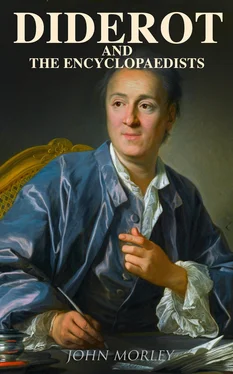Marmontel warns us that he who only knows Diderot in his writings, does not know him at all. We should have listened to his persuasive eloquence, and seen his face aglow with the fire of enthusiasm. It was when he grew animated in talk, and let all the abundance of his ideas flow freely from the source, that he became truly ravishing. In his writings, says Marmontel with obvious truth, he never had the art of forming a whole, and this was because that first process of arranging everything in its place was too slow and too tiresome for him. The want of ensemble vanished in the free and varied course of conversation.[23]
We have to remember then that Diderot was in this respect of the Socratic type, though he was unlike Socrates, in being the disseminator of positive and constructive ideas. His personality exerted a decisive force and influence. In reading the testimony of his friends, we think of the young Aristides saying to Socrates: "I always made progress whenever I was in your neighbourhood, even if I were only in the same house, without being in the same room; but my advancement was greater if I were in the same room with you, and greater still if I could keep my eyes fixed upon you."[24] It has been well said that Diderot, like Socrates, had about him a something dæmonic. He was possessed, and so had the first secret of possessing others. But then to reach excellence in literature, one must also have self-possession; a double current of impulse and deliberation; a free stream of ideas spontaneously obeying a sense or order, harmony, and form. Eloquence in the informal discourse of the parlour or the country walk did not mean in Diderot's case the empty fluency and nugatory emphasis of the ordinary talker of reputation. It must have been both pregnant and copious; declamatory in form, but fresh and substantial in matter; excursive in arrangement, but forcible and pointed in intention. No doubt, if he was a sage, he was sometimes a sage in a frenzy. He would wind up a peroration by dashing his nightcap passionately against the wall, by way of clencher to the argument. Yet this impetuosity, this turn for declamation, did not hinder his talk from being directly instructive. Younger men of the most various type, from Morellet down to Joubert, men quite competent to detect mere bombast or ardent vagueness, were held captive by the cogency of his understanding. His writings have none of this compulsion. We see the flame, but through a veil of interfused smoke. The expression is not obscure, but it is awkward; not exactly prolix, but heavy, overcharged, and opaque. We miss the vivid precision and the high spirits of Voltaire, the glow and the brooding sonorousness of Rousseau, the pomp of Buffon. To Diderot we go not for charm of style, but for a store of fertile ideas, for some striking studies of human life, and for a vigorous and singular personality.
Diderot's knowledge of our language now did him good service. One of the details of the method by which he taught himself English is curious. Instead of using an Anglo-French dictionary, he always used one in Anglo-Latin. The sense of a Latin or Greek word, he said, is better established, more surely fixed, more definite, less liable to capricious peculiarities of convention, than the vernacular words which the whim or ignorance of the lexicographer may choose. The reader composes his own vocabulary, and gains both correctness and energy.[25] However this may be, his knowledge of English was more accurate than is possessed by most French writers of our own day. Diderot's first work for the booksellers after his marriage seems to have been a translation in three volumes of Stanyan's History of Greece. For this, to the amazement of his wife, he got a hundred crowns. About the same time (1745) he published Principles of Moral Philosophy, or an Essay of Mr. S. on Merit and Virtue. The initial stands for Shaftesbury, and the book translated was his Inquiry concerning Virtue and Merit.
Towards the same time, again, Diderot probably made acquaintance with Madame de Puisieux, of whom it has been said with too patent humour that she was without either the virtue or the merit on which her admirer had just been declaiming. We are told that it was her need of money which inspired him with his first original work. As his daughter's memoir, from which the tale comes, is swarming with blunders, this may not be more true than some of her other statements. All that we know of Diderot's sense and sincerity entitles him to the benefit of the doubt. The Philosophical Thoughts (1746) are a continuation of the vein of the annotations on the Essay. He is said to have thrown these reflections together between Good Friday and Easter Sunday. Nor is there anything incredible in such rapid production, when we remember the sweeping impetuosity with which he flung himself into all that he undertook. The Thoughts are evidently the fruits of long meditation, and the literary arrangement of them may well have been an easy task. They are a robuster development of the scepticism which was the less important side of Shaftesbury. The parliament of Paris ordered the book to be burnt along with some others (July 7, 1746), partly because they were heterodox, partly because the practice of publishing books without official leave was gaining an unprecedented height of license.[26] This was Diderot's first experience of that hand of authority, which was for thirty years to surround him with mortification and torment. But the disapproval of authority did not check the circulation or influence of the Thoughts. They were translated into German and Italian, and were honoured by a shower of hostile criticism. In France they were often reprinted, and even in our own day they are said not wholly to have lost their vogue as a short manual of scepticism.[27]
The historians of literature too often write as if a book were the cause or the controlling force of controversies in which it is really only a symbol, or a proclamation of feelings already in men's minds. We should never occupy ourselves in tracing the thread of a set of opinions, without trying to recognise the movement of living men and concrete circumstance that accompanied and caused the progress of thought. In watching how the beacon-fire flamed from height to height—
φάος δε τηέπομπον ουκ ηναίνετο
φρορα, προσαιθρίζουσα πόμπιμονφλόγα—
we should not forget that its source and reference lie in action, in the motion and stirring of confused hosts and multitudes of men. A book, after all, is only the mouthpiece of its author, and the author being human is moved and drawn by the events that occur under his eye. It was not merely because Bacon and Hobbes and Locke had written certain books, that Voltaire and Diderot became free-thinkers and assailed the church. "So long," it has been said, "as a Bossuet, a Fénelon, an Arnauld, a Nicole, were alive, Bayle made few proselytes; the elevation of Dubois and its consequences multiplied unbelievers and indifferents."[28]
The force of speculative literature always hangs on practical opportuneness. The economic evils of monasticism, the increasing flagrancy and grossness of superstition, the aggressive factiousness of the ecclesiastics, the cruelty of bigoted tribunals—these things disgusted and wearied the more enlightened spirits, and the English philosophy only held out an inspiring intellectual alternative.[29]
Nor was it accident that drew Diderot's attention to Shaftesbury, rather than to any other of our writers. That author's essay on Enthusiasm had been suggested by the extravagances of the French prophets, poor fanatics from the Cevennes, who had fled to London after the revocation of the edict of Nantes, and whose paroxysms of religious hysteria at length brought them into trouble with the authorities (1707). Paris saw an outbreak of the same kind of ecstasy, though on a much more formidable scale, among the Jansenist fanatics, from 1727 down to 1758, or later. Some of the best attested miracles in the whole history of the supernatural were wrought at the tomb of the Jansenist deacon, Paris.[30] The works of faith exalted multitudes into convulsive transports; men and women underwent the most cruel tortures, in the hope of securing a descent upon them of the divine grace. The sober citizen, whose journal is so useful a guide to domestic events in France from the Regency to the Peace of 1763, tells us the effect of this hideous revival upon public sentiment. People began to see, he says, what they were to think of the miracles of antiquity. The more they went into these matters, whether miracles or prophecies, the more obscurity they discovered in the one, the more doubt about the other. Who could tell that they had not been accredited and established in remote times with as little foundation as what was then passing under men's very eyes? Just in the same way, the violent and prolonged debates, the intrigue, the tergiversation, which attended the acceptance of the famous Bull Unigenitus, taught shrewd observers how it is that religions establish themselves. They also taught how little respect is due in our minds and consciences to the great points which the universal church claims to have decided.[31]
Читать дальше












